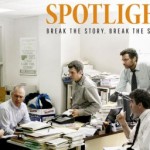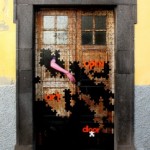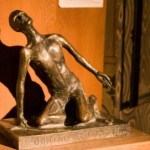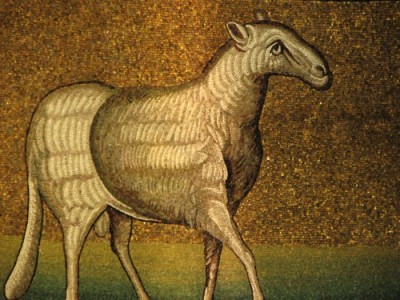 Often, in public prayers, there are litanies of the great acts of God – who gathers the waters into storehouses of the seas, who covers the earth with snow, then melts it, who forms mountains, heavens, stars and planets – we extoll the mighty and majesty of God.
Often, in public prayers, there are litanies of the great acts of God – who gathers the waters into storehouses of the seas, who covers the earth with snow, then melts it, who forms mountains, heavens, stars and planets – we extoll the mighty and majesty of God.
And we do cherish God’s small acts, the intimacies of God, but never in a litany. We keep them separate, treasures that stand alone: God, whose word is in your heart and mouth that you may do it; whose eye is on the sparrow; who whispers caution into the ear of Cain’s vengefulness. And Jesus tells stories of the small things God will not lose, which he calls parables of the kingdom. But no listing of them is compiled in our prayers.
Of all the intimacies of God, the best loved is the tale of God the shepherd seeking, finding, and carrying a lost lamb home. In our hearing, and often in our teaching, the lost lamb becomes a beloved pet. It is easy to conflate the story the prophet Nathan told of such a pet lamb, to King David, with the found lamb in Jesus’ kingdom tale, told to the crowd. 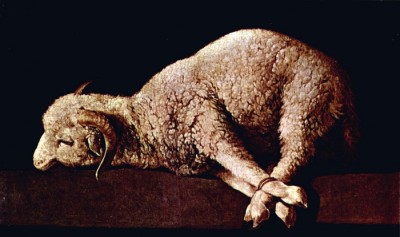 Any of us could be the lost lamb that wandered off. And all of us are lost, foolishly, more than once in our lifetimes. It comforts our weariness to think that such bonds of affection tie us to God.
Any of us could be the lost lamb that wandered off. And all of us are lost, foolishly, more than once in our lifetimes. It comforts our weariness to think that such bonds of affection tie us to God.
Yet, if we make a list of God’s small acts, a litany of small things to which Jesus has attached an image of God, only the lamb can be seen as a pet, as beloved. And in comparison, the importance of the lamb to God changes, becoming like the other small things God is mindful of.
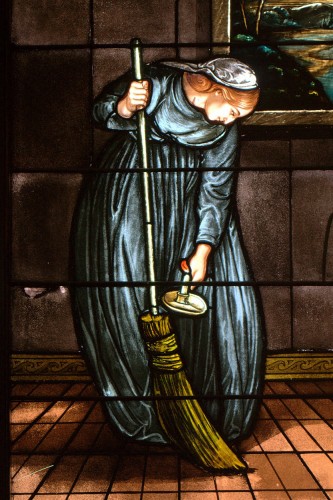 The list of small things includes: sparrows sold two-for-a-penny that are never out of God’s sight; a tiny mustard seed that grows into a bush where the birds may nest; the seed that God-the-wild-farmer strews willy nilly around the world; the yeast God-the-baking-woman kneads into a vast amount of flour; and most of all, the coin God-the-widow spends all day hunting the house for: together, these show a concern for economy, for the household, for the harvest, for the feeding of many. And none of them has anything to do with fondness.
The list of small things includes: sparrows sold two-for-a-penny that are never out of God’s sight; a tiny mustard seed that grows into a bush where the birds may nest; the seed that God-the-wild-farmer strews willy nilly around the world; the yeast God-the-baking-woman kneads into a vast amount of flour; and most of all, the coin God-the-widow spends all day hunting the house for: together, these show a concern for economy, for the household, for the harvest, for the feeding of many. And none of them has anything to do with fondness.
Seeds are not an object of affection. They hold hope and promise of a harvest that may be. Likewise, yeast. Yeast raises bread but not, by itself, the human heart. And the same for sparrows, a poor man’s temple offering. My brother-in-law, a lifelong birder and a man of tender heart, dislikes sparrows, which to him are pests in the garden of avian delights. When I say they bring me joy, he disapproves, excepting only the English song sparrow, and he assures me is altogether a different bird. In Jesus’ world, where the role of sparrows was for public sacrifice only, they would not have been seen as pets.
Most of all, the coin. Who does not value money, for which many have sold their souls? Yet it is the things the money can buy, not the money itself, that holds our affection and our longing.
I do not like to think of myself as one of God’s coins. As a seed in God’s planting apron. As a packet of yeast God is kneading into flour. As a seed whose future is to become a scrubby mustard bush. I would rather be a lamb, carried home.
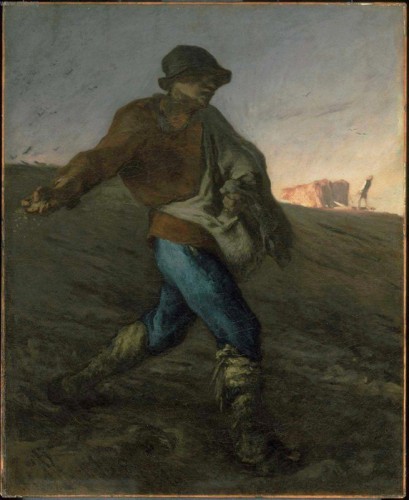 The lost lamb of Jesus’ tale belongs in the litany of small things, his tale of it is quite the same as the tales of other small things, and in his tale, God who will not let it go , values it is as part of the herd, not apart from the herd. The economy of the shepherd, the livelihood of pasture and town, and the place where the heart and vision of God live, are the herd, the whole, the all.
The lost lamb of Jesus’ tale belongs in the litany of small things, his tale of it is quite the same as the tales of other small things, and in his tale, God who will not let it go , values it is as part of the herd, not apart from the herd. The economy of the shepherd, the livelihood of pasture and town, and the place where the heart and vision of God live, are the herd, the whole, the all.
Since childhood, I have lived with pets, dogs, cats, a goldfish or two. This morning, after the first really cool end-of-summer night, I woke with a cat purring in my ear, snuggled round my head, sleeping peacefully. Neither she nor I were lost, in this moment of home. But the truth is, I do not trouble myself much over the fate of cats as a whole, only this one cat do I bend my attentions towards, only this one cat gets me to buy expensive foods and toys, only this one cat do I groom.
I have, I believe, preached indulgently about the lamb, as if it, too, were separately important to God. As if God were not the keeper of herds but the keeper of one, who is therefore – therefore – therefore – of great value.
When the 99 recede in value, when the one gains value that is entirely its own, when the value is placed on preferential fondness, our vision – those new eyes Jesus always wanted people to gain from these stories – changes. After all, why should we care about all those Syrians, all those Egyptians?
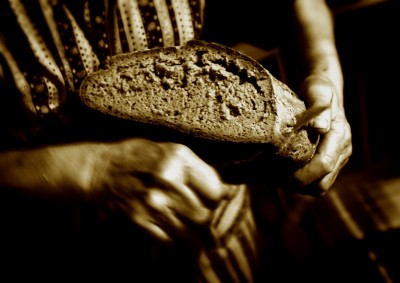 Who has not lost a coin and let it go? Underprepared, and broken the holy bread into smaller bits? Chopped down a brambly bush without regard for its value as a roost? Planted seed carefully only in my own garden? But for a pet I will search and search, not to restore the whole herd, but only to restore that one to me.
Who has not lost a coin and let it go? Underprepared, and broken the holy bread into smaller bits? Chopped down a brambly bush without regard for its value as a roost? Planted seed carefully only in my own garden? But for a pet I will search and search, not to restore the whole herd, but only to restore that one to me.
It is who we are in God’s heart that needs a focus adjustment when we teach the lost lamb without the lost coin, without the yeast, without the seeds. In the bustling, bus station kingdom of God, arrivals and departures happen all the time, for everyone is part of the journey, coming and going.
___________________________________________________
Illustrations:
1. Lamb of God. 527AD Basilica dei Santi Cosma e Damiano Rome Italy. Vanderbilt Divinity School Library, Art in the Christian Tradition.
2. The Lamb, Francisco de Zurbaran, 1638. Madrid, Spain. Vanderbilt Divinity School Library, Art in the Christian Tradition.
3. The Lost Coin. Stained Glass Window. Vanderbilt Divinity School Library, Art in the Christian Tradition.
4. The Sower 1850 Jean Francois Millett Museum of Fine Arts, Boston. Vanderbilt Divinity School Library, Art in the Christian Tradition.
5. Bread of Life, Photograph. Vanderbilt Divinity School Library, Art in the Christian Tradition.


